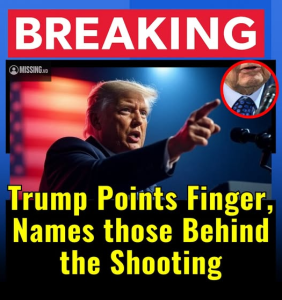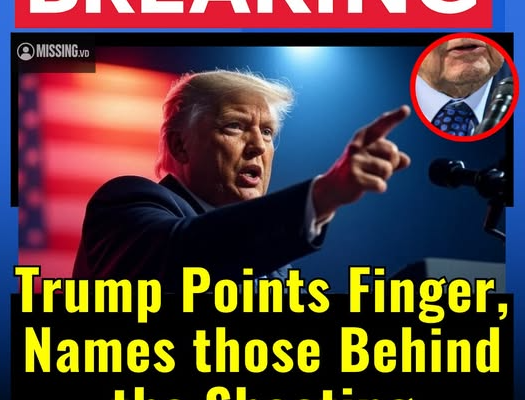Trump’s Crusade Against Youth Radicalization: Unmasking the Architects
In the turbulent landscape of American politics, few figures have stirred as much controversy and fervent loyalty as President Donald Trump. His rhetoric, often blunt and polarizing, has consistently targeted what he sees as the ideological corruption of America’s youth. In recent speeches and interviews, Trump has intensified his claims that powerful networks—comprising political operatives, academic institutions, and digital platforms—are behind the funding, training, and radicalization of young people. But who are these actors, and what does Trump’s exposure of them reveal about the broader cultural and political battle unfolding in the United States?
The Alleged Architects of Youth Radicalization
Trump’s narrative centers on the idea that progressive elites are orchestrating a campaign to indoctrinate young Americans. He points to universities, nonprofit organizations, and tech companies as the primary culprits. According to Trump, these institutions are not merely liberal-leaning—they are actively engaged in shaping a generation that rejects traditional values, embraces identity politics, and views America through a lens of systemic oppression.
This claim is not new. Conservative commentators have long accused academia of harboring radical leftist ideologies. What’s different now is the scale and specificity of Trump’s accusations. He has named organizations like Black Lives Matter, certain teachers’ unions, and even the Department of Education as complicit in this ideological project. He argues that these groups receive funding from wealthy donors—often linked to Democratic causes—and use that money to push curricula and activism that undermine patriotism, masculinity, and religious faith.
Masculinity, Identity, and the “MAGA Boyz”
One of the most striking dimensions of Trump’s appeal to young people—particularly young men—is his framing of masculinity as under siege. In conservative online spaces, including the so-called “MAGA Meme Pack,” Trump is portrayed as a symbol of unapologetic masculinity. These digital communities use memes and viral content to spread pro-Trump messages, often mocking progressive values and celebrating traditional gender roles.
This strategy has proven effective. Many young men, feeling alienated by cultural shifts that emphasize inclusivity and emotional vulnerability, gravitate toward Trump’s brand of defiant masculinity. As Niobe Way, a professor at NYU, explains, these young men often feel “put on the bottom of the hierarchy of humanness”. Trump’s rhetoric validates their grievances, offering them a sense of belonging and purpose.
Social Media: The New Training Ground
Trump has repeatedly emphasized the role of social media in youth radicalization. Ironically, while he accuses platforms like TikTok and Instagram of promoting leftist ideologies, his own supporters have weaponized these same platforms to spread conservative messages. The decentralized nature of meme culture allows influencers to bypass traditional gatekeepers and reach millions of young users with emotionally charged content.
This digital battleground is where much of the “training” occurs. Young people are not attending ideological boot camps—they’re scrolling through curated feeds that reinforce specific worldviews. Conservative influencers have mastered the art of packaging complex political ideas into digestible, entertaining formats. Trump’s team has embraced this strategy, using humor, satire, and shock value to engage young audiences.
Funding Streams and Ideological Infrastructure
Trump’s claims about funding are perhaps the most provocative. He alleges that billionaire philanthropists—such as George Soros—are funneling money into activist organizations, educational initiatives, and media outlets that promote radical ideologies. While Soros has indeed supported progressive causes, the idea that he or others are orchestrating a mass radicalization campaign is hotly contested.
Still, there is evidence that certain nonprofits and think tanks play a significant role in shaping youth activism. Grants, fellowships, and scholarships often come with ideological strings attached. Students are encouraged to engage in social justice work, attend workshops on systemic racism, and participate in protests. Trump argues that this ecosystem creates a feedback loop: funding supports activism, which in turn generates media attention and political influence.
The Psychology of Radicalization
Beyond the political accusations, Trump’s narrative taps into deeper psychological dynamics. Radicalization, as scholars note, is not merely about adopting extreme beliefs—it’s about identity, belonging, and perceived injustice. Young people who feel disenfranchised—whether due to economic hardship, racial tension, or cultural alienation—are more susceptible to radical ideologies.
Interestingly, some analysts argue that Trumpism itself mirrors the radicalization process. A recent study compares the psychological trajectory of Trump supporters to that of religious extremists. Both groups experience identity crises, cling to mythic narratives of superiority, and identify scapegoats to explain their suffering. In this view, Trump’s movement is not just a political campaign—it’s a cultural insurgency.
The Counter-Narrative: Progressive Voices Respond
Progressive critics reject Trump’s framing as fearmongering and scapegoating. They argue that young people are not being radicalized—they’re responding to real injustices. Climate change, racial inequality, and economic instability are not ideological constructs—they’re lived realities. Activism, in this view, is a rational response to systemic problems.
Moreover, many educators and nonprofit leaders see their work as empowering rather than indoctrinating. They aim to equip young people with critical thinking skills, civic awareness, and empathy. The accusation that they are “training radicals” is seen as an attempt to delegitimize dissent and silence marginalized voices.
What’s at Stake?
Trump’s exposure of the alleged radicalization network is more than a political tactic—it’s a cultural reckoning. It forces Americans to confront competing visions of youth, education, and national identity. Are young people being misled by ideological puppeteers, or are they awakening to the realities of a changing world?
The answer likely lies somewhere in between. Social media, economic anxiety, and cultural fragmentation have created fertile ground for both progressive and conservative radicalization. Trump’s critique may oversimplify the dynamics, but it highlights a genuine concern: the future of America depends on how its youth are shaped.
Conclusion: A Battle for the Soul of a Generation
In exposing what he sees as the machinery behind youth radicalization, Trump is not just pointing fingers—he’s rallying his base. He’s offering an alternative vision of strength, tradition, and national pride. Whether one agrees with his diagnosis or not, the conversation he has ignited is crucial.
The battle for young hearts and minds is not just about politics—it’s about meaning, identity, and belonging. As America navigates this cultural crossroads, the question remains: who will shape the next generation, and what values will they carry forward?


